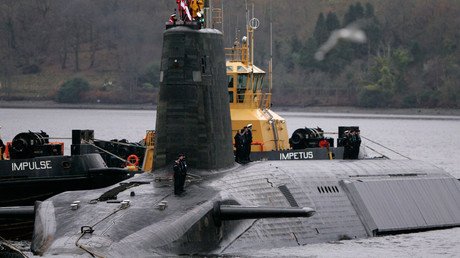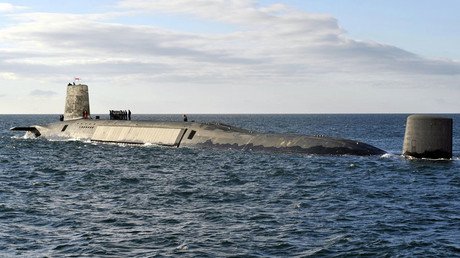Dozens of nuclear alerts underreported by British MoD, new study reveals
The UK Ministry of Defense has been accused of downplaying the real dangers stemming from the UK nuclear deterrent after the report by a safety watchdog put the number of accidents, involving British nukes, at 110, four times higher the official count.
Unveiled on Wednesday by the Nuclear Information Service (NIS), an independent nuclear watchdog, the report sheds light onto dozens of mishaps involving British nuclear weapons, featuring previously unreported accidents with potentially disastrous consequences. The in-depth study, which traces back all 65 years of the British nuclear program, arranges accidents into seven sections in accordance with their place of origin.
The report is based on the official findings, including the report on nuclear weapons safety written by Professor Sir Ronald Oxburgh, information revealed during parliamentary questions, obtained under the Freedom of Information Act as well as from whistleblowers, witnesses and other researchers.
The biggest group of all lists accidents that took place on nuclear-capable submarines, ships and aircraft. The causes for a total of 45 mishaps, including 24 that occurred with nuclear-armed submarines, range from collision and fires to the effects of lightning.
In one of the most notable accidents of that kind, Royal Navy submarine HMS Vanguard, which is capable of carrying up to 48 Trident nuclear warheads, collided with a French Le Triomphant submarine, which could be armed with about the same amount of TN75 nuclear warheads. The circumstances of the accident, which happened early February 2009 in the Atlantic Ocean, were hushed up at the time and still not known to the full.
Although the official investigation report into the collision came to the reassuring conclusion that “at no time was nuclear safety compromised and the Strategic Weapon System remained inside tolerable limits at all times”, whistleblowers’ accounts are far more daunting. An officer who was on board the UK submarine reportedly said “We thought, this it we’re all going to die,” while recalling the incident in the conversation with Royal Navy whistleblower William McNeilly.
Other case studies include a nuclear warhead carrier sliding off the rode into the ditch on January 10, 1987 in Wiltshire. The misfortune is described by the authors as “most visible” and “embarrassing” incident to date. Overall, 22 road transportation incidents, among them overturning of vehicles carrying nukes, have been cited in the report.
While only 14 accidents, linked to the faults in manufacturing and production process, are listed in the report, the most severe nuclear accident in UK history also falls into this category. The fire at the Windscale plant in 1957 led to massive release of radiation from graphite-moderated reactor that triggered “around 100 fatal cancers and around 90 non-fatal cancers.”
The report also lists 21 “security-related” incidents and eight incidents blamed onto the improper storage and handling of the nukes.
The comprehensive study, spanning over 100 pages under an awe-inspiring title “Playing with Fire,” blames the defense ministry for attempting to sweep the issue of nuclear safety under the carpet by concealing essential details of the incidents and downplaying their impact.
READ MORE: Trident whistleblower calls out MoD’s ‘lame attempt’ to excuse nuke malfunctions
The report argues that the official data released by the British Defense Ministry in 2003 which put the number of incidents at 27, is “far from a full list of all the accidents.”
It is not the first time the British military has been accused of covering up major issues with its nuclear deterrent. News on a failed Trident missile test, carried out off Florida coast in June 2016, sparked a new round of heated debates on the British nuclear program. The routine test performed by the HMS Vengeance in June 2016 from Port Canaveral went horribly wrong with the missile heading back to the US mainland. However, the UK authorities did not issue any statement on the failed test, reportedly, advised to refrain from sharing unfavorable data by US colleagues.
READ MORE: Trident nukes useless against today’s actual security problems – CND report
The Trident missile malfunction came just weeks before the UK parliament voted in favor of renewing controversial Britain’s Trident deterrent, estimated to cost some £40 billion.
In January, McNeilly, who was first to leak the details about the serious fire issues aboard Trident submarine, told RT that he has witnessed Trident “fail 3 out of 3 WP 186 Missile Compensating Tests.”














